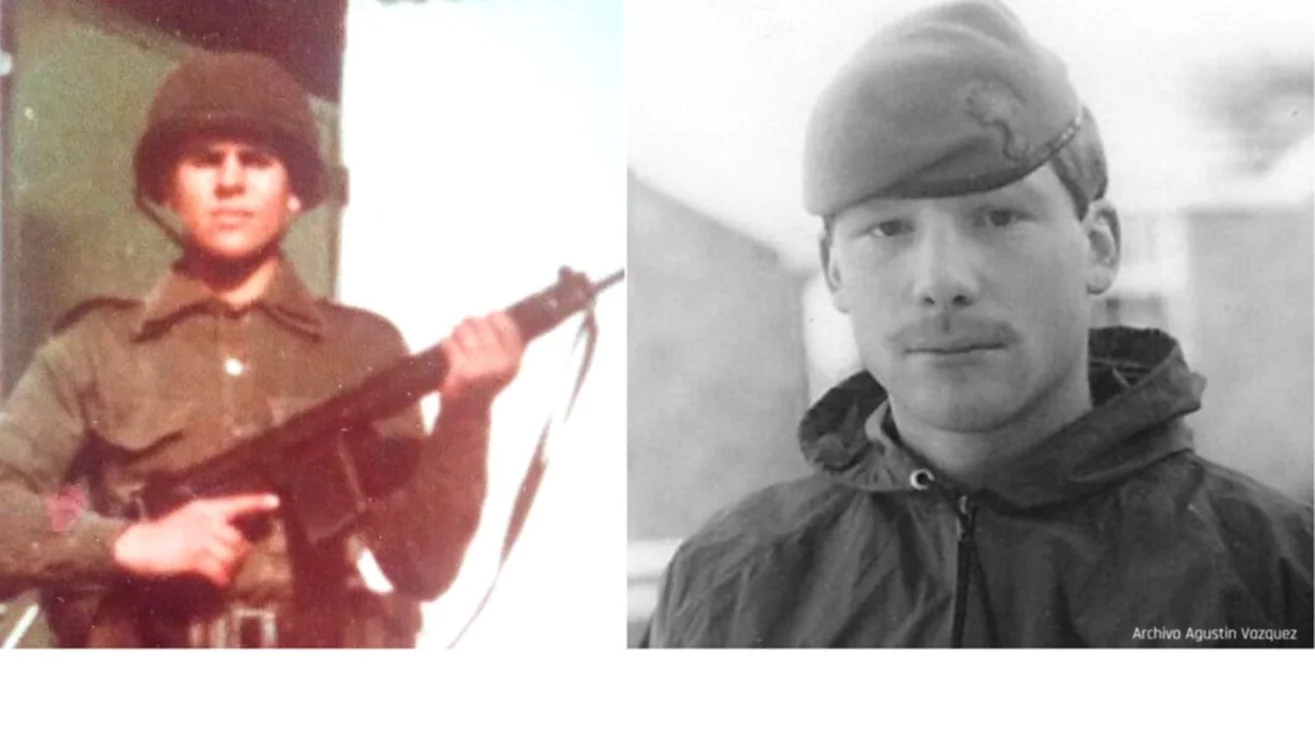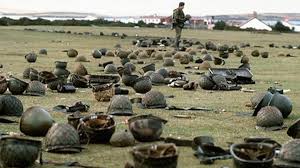En vísperas del 43 aniversario de la Guerra de Malvinas de 1982, un gesto aparentemente humano se ha convertido en el centro de atención: la devolución del casco a un soldado argentino por parte de un veterano británico.
Pero tras esta acción, se oculta un complejo entramado de manipulación y colonialismo que invita a la reflexión. La entrega del casco que usó el excombatiente Raúl Guerreiro, no es un simple acto de reconciliación, sino parte de una estrategia más amplia que busca suavizar la imagen del Reino Unido, un país que viene protagonizando desde hace más de 500 años, el saqueo y el colonialismo en diversas partes del mundo.
La historia comienza cuando el casco que usaba y tenía a cargo Raúl Guerreiro, fue tomado como botín de guerra, tras la rendición del 14 de junio de 1982; y evidentemente fue robado y estado en posesión durante 43 años, del inglés Mark Davies.

La conexión entre estos los veteranos de la guerra fue facilitada por el historiador argentino Agustín Vázquez, quien se enteró dónde estaba el casco por información que le dio, Richard Lee, otro veterano británico.
Para que quede claro, bien vale decir que este casco y los miles de cascos restantes que usó la tropa argentina, nunca fueron propiedad de los soldados. Tampoco los fusiles, ni las municiones, ni la chaquetilla, ni la mochila, ni los calzoncillos, ni las medias, ni los borceguíes. Nada, absolutamente nada de lo que cargaban o tenían puestos nuestros combatientes eran propios; porque todo eso, era y es patrimonio y propiedad del Ejército, la Armada o la Fuerza Aérea. Por ende, del Estado Nacional Argentino.

Mientras la recuperación de esta clase de elementos puede parecer un acto altruista, la narrativa que envuelve la devolución del casco roza lo absurdo, si se considera que quienes están detrás de este acto son actores de una historia cargada de violencia y opresión.
Recordemos que el imperio británico invadió las Islas Malvinas en 1833, implantando una población e instalando luego de la guerra, la más grande base militar de la OTAN en Sudamérica. Donde incluso submarinos nucleares norteamericanos han realizado operaciones y ejercicios de guerra permanentemente, en territorio argentino ilegítimamente usurpado.
Ahora, con el objetivo de reafirmar su dominio en el Atlántico Sur, ejerciendo una forma de "soft power", o “Poder Blando” que disfraza intereses geopolíticos bajo un manto de aparente humanismo; el regreso del casco se convierte en una pantomima para confundir a los argentinos y la opinión pública.
Una forma de lavado de imagen del imperialismo anglosajón que intenta borrar las huellas de los años de colonialismo sobre tantas naciones del mundo y, en algunos casos, persistiendo hasta la actualidad.
El hecho de que el casco será presentado en la conmemoración del 43 aniversario de la guerra, pone en total evidencia de cómo los argentinos caemos nuevamente en la trampa de la seducción británica, ignorando las implicaciones más amplias de estos gestos, que son en realidad derivados de una profunda falta de memoria y una vergüenza para nuestra historia.
Vázquez, adulador de la falsa honorabilidad británica, al describir su viaje a Londres para recoger el casco, pondera la "integridad y el honor de los veteranos británicos". Pero, ¿acaso esta devolución no forma parte de un juego más amplio en el que se busca perpetuar un relato favorable al Reino Unido?
Resulta que, de esta manera, por acciones de algunos argentinos como Vázquez, en apariencias; el enemigo deja de ser el que ordenó hundir fuera de la zona de combate al Crucero ARA General Belgrano, el que mató a los soldados heridos y prisioneros en Monte Longdon, el usurpador, el colonialista y el saqueador de los recursos naturales de su propio país; asunto que el historiador se olvida poner en la balanza y evidenciar como hecho mayúsculo de lo sucedido durante y luego de la guerra.
El acto de devolver un casco en este contexto se convierte en un ridículo simbolismo que encierra en sí, la voluntad de los británicos de seguir posicionándose como salvadores en una narrativa que debería ser revisada desde una perspectiva crítica.
Gestos que en realidad son una manera de seguir controlando la percepción de los pueblos colonizados, para fácilmente desplazar la opinión pública en favor de sus colonizadores, en vez de contemplar las heridas que estos invasores han dejado en la historia argentina y latinoamericana.
En conclusión, la devolución del casco de Raúl Guerreiro no debe ser vista simplemente como un acto de buena voluntad, sino como una maniobra dentro de una estrategia de seducción que busca mantener el status quo de la influencia británica en el Atlántico Sur, un dominio colonial que se levanta mediante la fuerza y se transforma en el robo y depredación de los recursos naturales de la región.
Un recordatorio de que la reconciliación no puede surgir de un solo lado y que la memoria histórica debe ser preservada con toda su complejidad, no sólo en términos de gestos simbólicos, sino en el reconocimiento de los verdaderos roles que cada nación ha jugado en ella.
FUENTE:






